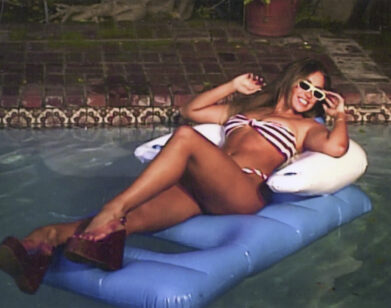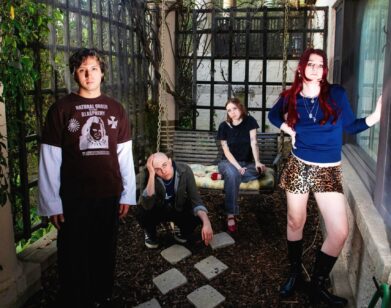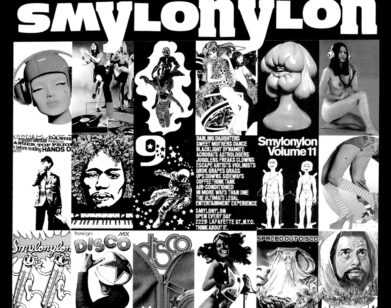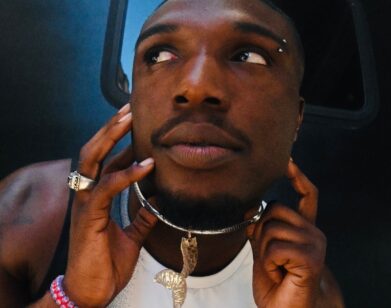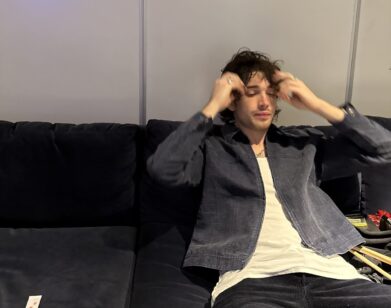Freddie Stevenson’s City Life
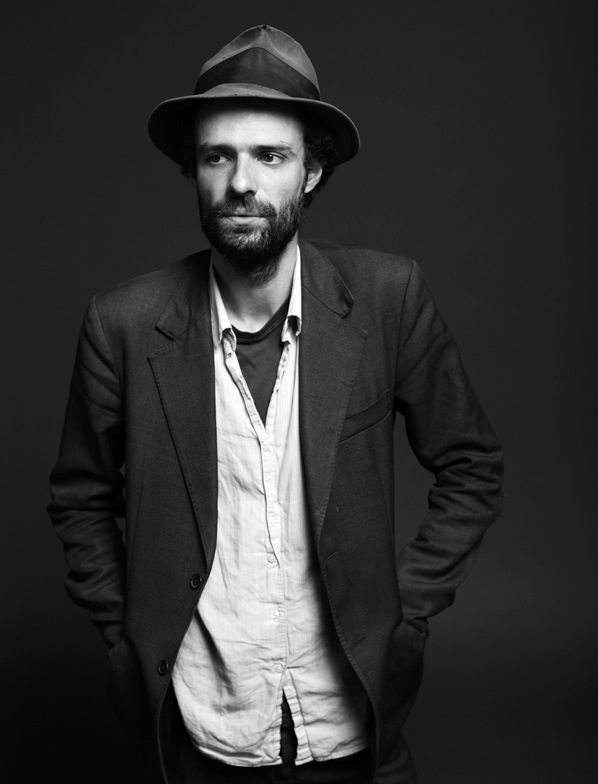
PHOTO OF FREDDIE STEVENSON, ABOVE, COURTESY OF MARC MCANDREWS
New York City may have just found the troubadour it’s been searching for, in Edinburgh native Freddie Stevenson. His folk songs capture the romance and loss of moments in time, with a heavy emphasis on meaningful songwriting. Stevenson was trained as an actor, but music has been an innate passion for him. Growing up with artist parents, Stevenson found his love for playing the guitar at 11 years old. Since then, songwriting and playing guitar have become a central focus for him. Stevenson currently has a residency at Rockwood Music Hall every Sunday at midnight performing his solo work, but he also takes part in playing in The Dirty Urchins. Stevenson’s album, The City is King, out yesterday, captures Stevenson’s feelings on living in New York City and transitioning into a new life. His music is existential and follows the emotions of past romances and travels.
We spoke with Freddie Stevenson at an apartment in Williamsburg on musical osmosis, playing on subway platforms and catching the music “bug.”
ILANA KAPLAN: How’d you start off as a musician?
FREDDIE STEVENSON: You get bitten by the bug.
KAPLAN: Like a bedbug?
STEVENSON: It’s like a bedbug. It’s really hard to get rid of. You have to steam your soul. No, for me, my mother is an American. I grew up around music. They’re not musicians, but they’re both artists: my mother is a writer and my father is a sculptor. I grew up and had Bob Dylan and Joni Mitchell records lying around. And really did it for me was, my mom had a college reunion with all of her old college friends, who used to be in a band together called The Heavenly Days Quartet in New York in the late ’60s, early ’70s. One of them has a ranch in Wyoming. When I was about 11, I went out there for a family holiday. Every night after dinner, they would take out their guitars and start playing. I just would listen. One night, we were actually around a campfire just trading songs and I just thought, I want to play guitar and write songs. So, I got back to Scotland and immediately asked for a guitar. I haven’t really stopped playing since.
KAPLAN: How did you meet Julia Haltigan?
STEVENSON: I met Julia through a mutual friend of ours, Scarlett Johansson, actually. My lady, I was with for a while, is an actress. They were working together. Scarlett got to know my music and became a fan. When I got to New York, I was playing at the 11th Street Bar, which is now where Julia plays every Tuesday. That was the first place I started playing in New York. Scarlett introduced me to Julia. We started playing together and hanging out. Now we play together pretty much all the time.
KAPLAN: What’s been the transition from The Dirty Urchins to your solo work?
STEVENSON: Well, The Dirty Urchins started really as… I didn’t know how to make money. I was here in New York, and I didn’t know how to make money. It was the beginning of 2009. It was cold, like February, and I had met David Luther, again, at the 11th Street Bar. David Luther is a great saxophone player and a great musician all around. He had done street performing and he had done it for about six years. He was playing in a band called The Blue Vipers. He suggested that we just go down to the subway and try it. So, we did. Then literally, Bennett Miller came down and met us on the subway platform. Really, the transition was that I was sort of doing my own songs. I suppose I started to write differently. When I moved to New York, one of the first musicians I started playing with was James Maddock. We kind of hit it off. We were both English. We started playing together a lot. James taught me a lot about writing in a simpler way. It actually kind of came out of that. You’re playing on the streets. You want to come up with melodies that literally hook people as they walk by. One thing about The Dirty Urchins that I think is very important, when I re-started it; I was the “so-called songwriter.” David had written a few songs, but then he started writing a lot. Bennett started writing a lot. Then when Julia came in, she’s a very prolific and very great writer. It’s really about sharing each other’s songs and learning off of each other.
KAPLAN: Who are some of your influences?
STEVENSON: I come from more of a standard singer-songwriter background, classic Bob Dylan and Van Morrison, with a strong Scottish-folk influence—like every 15-year-old that plays guitar, listening to Nick Drake and playing all that finger-picking stuff. David is much more R&B, soul and blues. Bennett is much more rock, modern-rock. Julia has her wonderful, minor key, Tom Waits, Americana, very ephemeral style. When you sit next to someone playing songs all day, osmosis happens. You just learn and grow as a writer and a performer.
KAPLAN: How is The City is King different from previous albums?
STEVENSON: I think, for one thing, this group of 10 songs came out of a period of writing of about three years where I must have written about 70 songs. What I did was, I left a situation in the UK. My life changed quite quickly. I ended up over here more. I was just traveling around with my laptop and a couple of mics. I was just writing wherever I was, whether I was here or back in Scotland. When it came time to make this record, I had a really strong reservoir of songs. Also, I had a story to tell. I remember when I did my first two records, whatever musically is happening on the record, people need a story. What’s the story? This is the story of me coming to New York and that transition. I think it successfully has a balance in there of songs that are heavily influenced by New York. Also, me being in Scotland writing, it has that balance too. It’s more realized.
KAPLAN: Who have been some of the most interesting performers that you’ve shared the stage with?
STEVENSON: All kinds of people. I’ve been with performers of all sorts. I trained as an actor, too, in London, so I’ve worked with some wonderful actors. Transitioning more into music, I have to really say the ones I perform with regularly at the moment because I perform with them so much. I love performing with Julia, The Dirty Urchins, and I love working with James Maddock.
KAPLAN: What are your plans for touring and what The City is King performances will be like?
STEVENSON: What we’ve been doing with The City is King, I’ve been doing a residency at Rockwood Music Hall at midnight: the midnight crisis. We’re exploring the sounds on the record and expanding it, really. I’m trying to build some momentum in New York itself, and then have it spread out from there. In January, Julia and I are going to go on an adventure down to New Orleans and back. I’ll try and spread it out there. It’s quite important to me that it has some sort kind of life in the UK as well, because I lived there and played there so much. I think it’s going to be a process of osmosis, I hope. It’s just going to seep out. I’m not working with a label at the moment. I don’t have a strict battle plan… yet.
FREDDIE STEVENSON’S ALBUM THE CITY IS KING IS OUT NOW. FOR MORE ON THE ARTIST, VISIT HIS WEBSITE.

